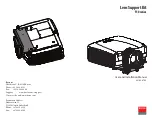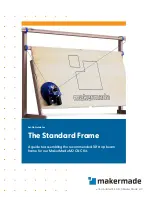
User's Guide HDSPe MADI
© RME
23
12.5 Digital Recording
Unlike analog soundcards which produce empty wave files (or noise) when no input signal is
present, digital I/O cards always need a valid input signal to start recording.
To take this into account, RME included a comprehensive I/O signal status display (showing
sample frequency, lock and sync status) in the Settings dialog.
The sample frequency shown in the Settings dialog (see chapter 11, screenshot Settings) is
useful as a quick display of the current configuration (the box itself and all connected external
equipment). If no sample frequency is recognized, it will read ‘No Lock’.
This way, configuring any suitable audio application for digital recording is simple. After select-
ing the required input, HDSPe MADI displays the current sample frequency. This parameter can
then be changed in the application’s audio attributes (or similar) dialog.
The screenshot to the right shows a typical dialog
used for changing basic parameters such as
sample frequency and resolution in an audio ap-
plication.
Any bit resolution can be selected, providing it is
supported by both the audio hardware and the
software. Even if the input signal is 24 bit, the
application can still be set to record at 16-bit reso-
lution. The lower 8 bits (and therefore any signals
about 96dB below maximum level) are lost en-
tirely. On the other hand, there is nothing to gain
from recording a 16-bit signal at 24-bit resolution -
this would only waste precious space on the hard
disk.
It often makes sense to monitor the input signal or send it directly to the output. This can be
done at zero latency using
TotalMix
(see chapter 24).
An
automated
control of real-time monitoring can be achieved by Steinberg’s ASIO protocol
with our ASIO drivers and all ASIO 2 compatible programs. When 'ASIO Direct Monitoring' has
been switched on, the input signal is routed in real-time to the output whenever a recording is
started (punch-in).
Summary of Contents for HDSPe MAD
Page 5: ...User s Guide HDSPe MADI RME 5 User s Guide HDSPe MADI General ...
Page 28: ...28 User s Guide HDSPe MADI RME ...
Page 38: ...38 User s Guide HDSPe MADI RME ...
Page 39: ...User s Guide HDSPe MADI RME 39 User s Guide HDSPe MADI Connections and TotalMix ...
Page 46: ...46 User s Guide HDSPe MADI RME ...
Page 68: ...68 User s Guide HDSPe MADI RME ...
Page 69: ...User s Guide HDSPe MADI RME 69 User s Guide HDSPe MADI Technical Reference ...
















































